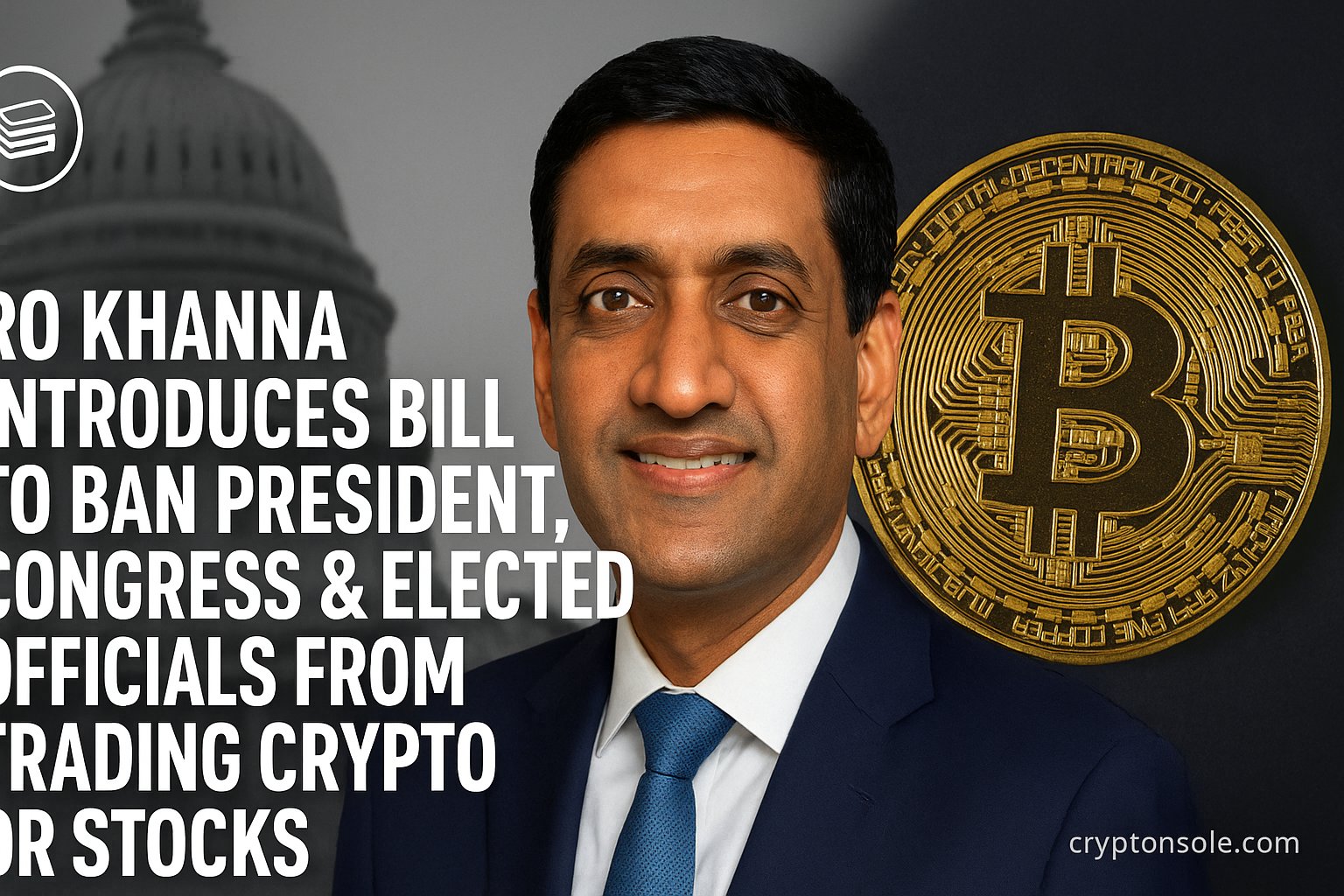Representative Ro Khanna (D-CA) has introduced landmark legislation that would prohibit the U.S. president, all members of Congress, elected officials and their immediate family members from buying or selling cryptocurrencies or individual stocks while in office. The proposal emerges amid growing scrutiny of potential conflicts of interest in financial trading by public office-holders.
What the bill proposes
According to press statements and coverage:
- The bill would apply to the president, vice-president (implicit through “president” if fully drafted), all members of Congress, and immediate family or households of those officials.
- It would ban active trading in cryptocurrencies and individual stocks/securities, not merely require disclosure. This moves beyond current law under the STOCK Act (2012) which mandates disclosures and imposes insider-trading prohibitions but does not ban trading.
- The legislation is framed as an ethics reform tool designed to enhance public trust by eliminating situations where officials and their families might benefit financially from privileged information, regulatory actions or market shifts.
Why this matters
- Conflict-of-interest risk in crypto & stocks: Lawmakers and executives routinely regulate industries that overlap with financial markets or digital assets; the proposal seeks to close perceived loopholes which critics say allow misuse of information or influence for personal gain.
- Extension into cryptocurrency domain: While existing reform efforts focus primarily on stock trading by officials, this bill explicitly includes the emerging asset class of crypto, reflecting heightened regulatory and ethics concerns about digital-asset markets.
- Ethical and political signaling: The introduction of a full ban signals growing bipartisan concern about the integrity of public office in the finance/crypto era; it may also influence public-servant recruitment, disclosure norms and constituent trust.
- Precedent and extension of 2012 law: The STOCK Act addressed misuse of non-public information for trading, but this bill goes further by removing the right to trade certain assets rather than merely tightening rules around trading.
Challenges & oppositions
- Enforcement and definitions: The bill must define key terms such as “immediate family,” “crypto asset,” and “individual stock”—and establish enforcement mechanisms for a practical ban across all jurisdictions and asset types.
- Political resistance and incentives: Critics argue broad trading bans may dissuade competent individuals from public service, particularly those with finance or technology backgrounds, and may face constitutional or legal challenges.
- Industry impact and unintended consequences: Some suggest that trading bans might push officials into more opaque asset classes (e.g., private equity, real estate, venture capital) or complicate personal financial planning for public-servants.
- Overlap with ongoing reform efforts: Stock-trading-reform bills already moving through Congress (e.g., active bans on stock trading by lawmakers) mean this crypto-extension may compete with or need to merge with those efforts.
What to watch for
- Bill text & co-sponsors: When Khanna introduces the full legislative text and reveals co-sponsors (especially bipartisan ones), momentum and structure of the reform will be clearer.
- Committee referral & hearings: Which House committees will handle the bill (e.g., House Administration, Financial Services, Ethics) and when public hearings are scheduled will indicate timetable.
- Overlap with stock trading reform bills: The relationship between this cryptocurrency-inclusive measure and current stock-trading-ban bills will matter — whether they merge, compete or one subsumes the other.
- Implementation plans & transitional rules: Look for proposed timelines, divestment windows, blind-trust mechanisms or exemptions (if any) for existing portfolios and family holdings.
- Industry and public-servant reactions: Responses from lawmakers, Congressional ethics offices, financial-services trade groups and crypto-industry associations will shape political viability.
Bottom line
The bill introduced by Rep. Ro Khanna marks a bold attempt to modernise ethics and trading-regulation standards for public office-holders — extending accountability into both traditional stock markets and the fast-growing cryptocurrency sector. If enacted, it would significantly tighten restrictions on financial participation by elected officials and their families, aiming to reduce conflicts of interest and restore public trust. However, significant legal, political and practical hurdles remain before trading restrictions of this scale can become law.
NFW6HG9V












